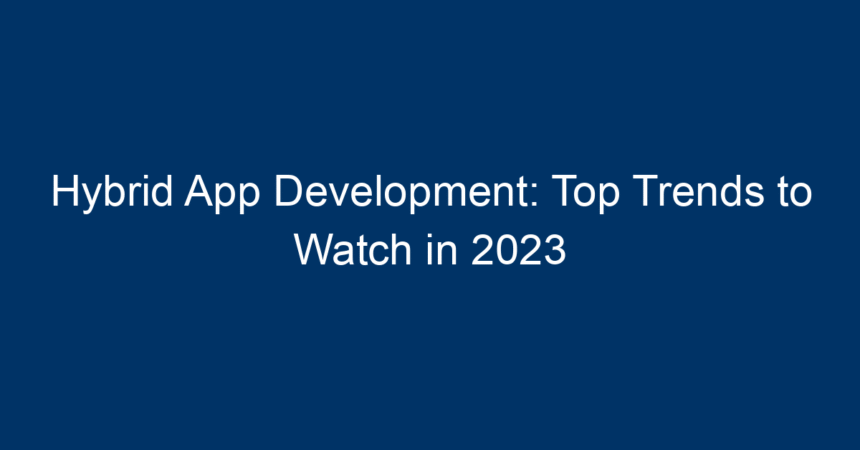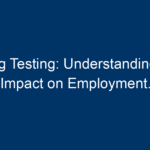In the fast-evolving world of technology, hybrid app development continues to gain traction as a robust solution that bridges the gap between web and native apps. As we venture deeper into 2023, the landscape of mobile application development is changing rapidly, prompting businesses to adapt to new trends. Whether you’re a developer, entrepreneur, or tech enthusiast, staying informed about the latest trends in hybrid app development can help you navigate this dynamic field effectively.
What is Hybrid App Development?
Hybrid app development refers to the process of creating applications that combine the best elements of both native and web applications. By leveraging frameworks like React Native, Flutter, and Ionic, developers can build apps that function seamlessly across multiple platforms—iOS, Android, and the web—using a single codebase. This approach significantly reduces development time and costs while ensuring a consistent user experience.
The Rise of Cross-Platform Frameworks
React Native and Flutter Lead the Charge
In 2023, two frameworks, React Native and Flutter, continue to dominate the hybrid app development landscape. React Native, backed by Facebook, allows developers to create high-performance mobile apps using JavaScript. Its component-based architecture enhances reusability and efficiency.
On the other hand, Flutter, developed by Google, uses Dart programming language and boasts a rich set of pre-designed widgets for stunning UI elements. Its hot-reload feature allows for real-time changes, drastically improving the pace of development. Both frameworks enhance collaboration among developers, making cross-platform development highly efficient.
Importance of Performance Optimization
Performance is a crucial factor in determining an app’s success. Hybrid apps need to perform like native apps to meet user expectations. Opting for solutions such as lazy loading, caching strategies, and optimizing APIs can dramatically improve loading times and overall app performance. In 2023, expect an increasing focus on performance optimization techniques within hybrid app development to provide users with a seamless experience.
Enhanced User Experience (UX)
Minimalistic Design Trends
As user attention spans continue to shorten, minimalistic design has become a key trend in hybrid app development. Developers are increasingly prioritizing clean and intuitive interfaces that allow users to navigate apps effortlessly. The emphasis is on functionality, ensuring every element of the design serves a purpose.
Personalization in UX
Personalization is no longer a nice-to-have; it has become essential. In 2023, hybrid apps will leverage machine learning to tailor experiences based on user behavior, preferences, and interactions. From content recommendations to customized notifications, a personalized UX can significantly enhance user engagement and retention.
Integrating Artificial Intelligence (AI)
Chatbots and Virtual Assistants
The integration of AI in hybrid app development is becoming increasingly commonplace. One of the most notable applications is the use of chatbots and virtual assistants. These AI-driven tools enhance user interaction by providing instant support and personalized responses. In 2023, we can expect to see more businesses incorporating AI-driven features into their hybrid apps to improve customer satisfaction.
Predictive Analytics
Another key aspect of AI integration is predictive analytics. By analyzing user data, hybrid apps can anticipate user needs and deliver a proactive experience. This trend is particularly relevant for eCommerce and service-oriented apps, where understanding customer behavior can lead to improved user experiences and increased sales.
Cloud-Based Solutions and Backend- as-a-Service (BaaS)
Importance in Hybrid App Development
Cloud technology is transforming hybrid app development by providing scalable solutions for data storage and processing. BaaS platforms enable developers to focus on building front-end features while relying on back-end providers for user authentication, database management, and cloud storage. In 2023, more developers will turn to cloud-based services to streamline the app development process and reduce time-to-market.
Increased Security Measures
As hybrid apps become more popular, the need for enhanced security has never been more critical. Cyber threats are on the rise, and protecting user data should be a top priority for every developer.
Implementing Best Practices
In 2023, expect hybrid app development to incorporate advanced security practices such as data encryption, secure APIs, and secure user authentication methods to safeguard user data. Regular security audits and updates are also crucial to maintaining robust cybersecurity within hybrid applications.
The Internet of Things (IoT) Integration
IoT and Hybrid App Development
The Internet of Things (IoT) continues to expand its reach, and hybrid apps are stepping up to the challenge. By integrating IoT capabilities, hybrid apps can facilitate smooth communication and operational integration across a suite of devices—this could range from smart home devices to wearable technology.
In 2023, developers will need to consider the interoperability of their hybrid apps with various IoT devices, creating a cohesive user experience across platforms.
Conclusion: Actionable Insights for Businesses
In the landscape of mobile app development, hybrid app development stands out as a versatile and efficient solution. As we explore the trends of 2023, here are some actionable insights to consider:
-
Focus on User-Centric Design: Prioritize a minimalistic and intuitive UI/UX that enhances user engagement.
-
Embrace Cross-Platform Frameworks: Consider using React Native or Flutter for efficient hybrid app development that meets both performance and scalability needs.
-
Invest in AI Integration: Leverage AI for chatbots, predictive analytics, and personalized experiences to build user loyalty.
-
Utilize Cloud Services: Reduce development time and enhance flexibility with cloud-based solutions and BaaS.
- Enhance Security Protocols: Implement robust security measures to protect user data and build trust with your audience.
By staying attuned to these trends, businesses can harness the power of hybrid app development in 2023, ensuring they remain competitive in a rapidly evolving market.




